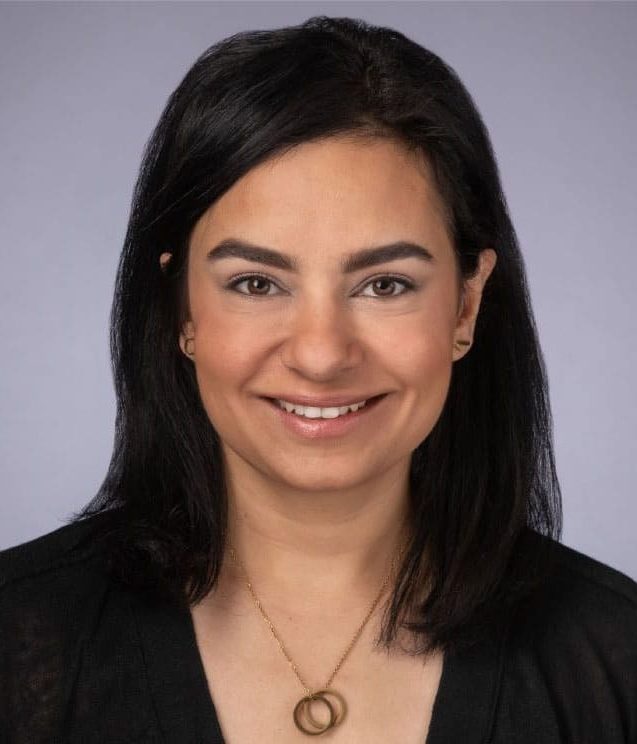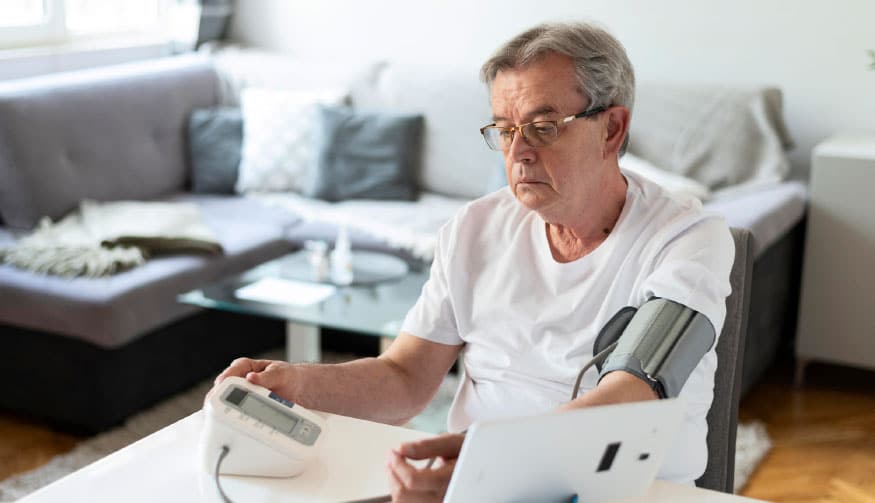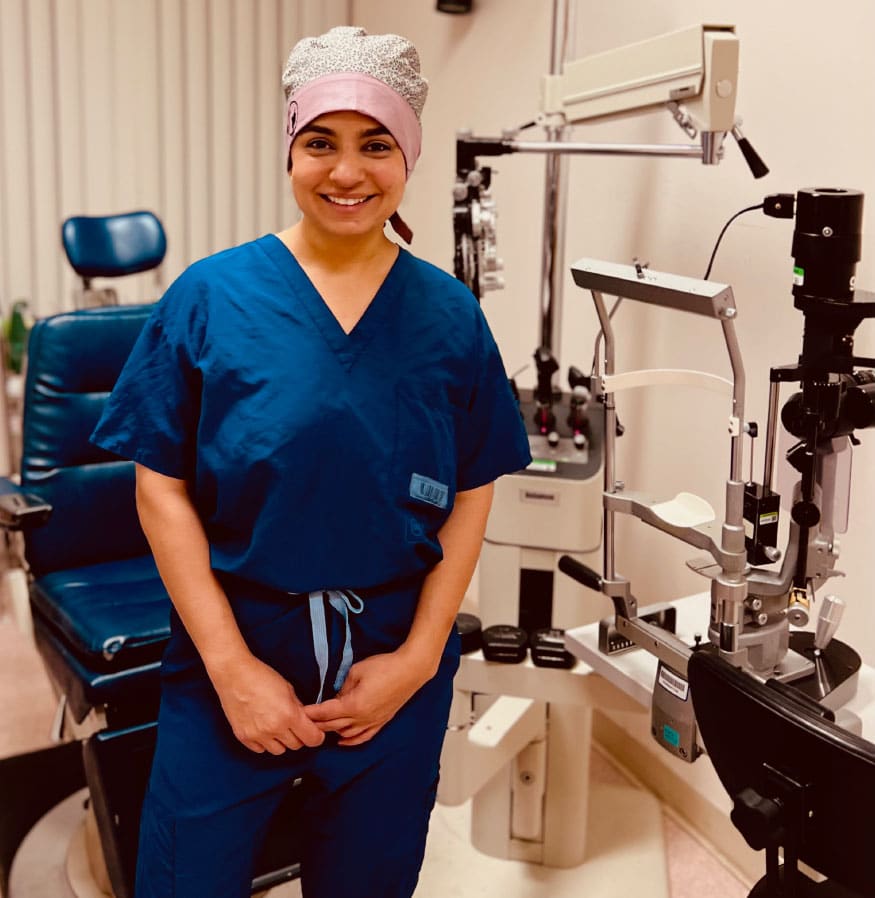
Dr. Setareh Ziai
University of Ottawa Eye Institute, Ottawa, ON
Dr. Setareh Ziai is an academic ophthalmologist at The Ottawa Hospital, specializing in cornea, anterior segment, external disease, and refractive surgery. As a clinician at a teaching hospital, she provides patient care while training the next generation of ophthalmologists. Dr. Ziai is a cofounder of Canadian Women in Medicine, an organization advocating for women doctors.
What are some steps I can take to help maintain healthy eyes throughout my life?
Anything you do to improve your overall health will also contribute to better ocular health. Things like exercise, not smoking, and eating a balanced diet can all help. Dark leafy greens, in particular, are really good for eye health, and studies have shown that certain vitamins can help with macular health in some patients.
Protecting the eyes from the sun is another big one. We’ve become so good at putting on sunscreen every time we go outside, but we often forget about our eyes. I find we’re still living in a society where sunglasses are more of a fashion statement than a necessity. We can’t forget the importance of UV protection, not just for our eyes, but also the structures around the eyes, including the eyelids.

What can an eye exam reveal about our overall health?
Our eyes are truly a “window into the soul” – we can get a lot of insight into a patient’s health simply by looking into their eyes. Some eye diseases are associated with systemic diseases, which are diseases that can affect the entire body. Sometimes when ocular signs are detected, it will prompt us to look for associated medical conditions elsewhere in the body.
One of the most common systemic conditions that we sometimes first find in the eyes, before a patient is even aware they have it, is high blood pressure. Long- or short-term high blood pressure can lead to changes in the structure of the blood vessels in the back of the eye. Diabetes is another condition that is sometimes first diagnosed by an ophthalmologist based on the appearance of the retina. Ophthalmologists can also help diagnose and monitor multiple sclerosis and other neurological diseases based on what’s happening with the patient’s eyes.

The opposite scenario is also true – oftentimes, a patient is diagnosed with a systemic condition, and then sent to an ophthalmologist to see if there are any associated changes in the eye.
I’ve never been to an ophthalmologist. What exactly is an ophthalmologist and why would I see one?

The first step in looking after your eyes is understanding the difference between an optician, an optometrist, and an ophthalmologist, or what we refer to as the 3 Os of the eye care team. While each of the 3 Os has a specific role in eye care, we work together to monitor and manage your eye health.
An optician is trained to help you see better; they will fit and dispense eyeglasses, contacts, and low vision aids and devices. As a primary eye care provider, an optometrist is who you’ll most likely routinely encounter. An optometrist has completed optometry school and is well qualified to provide screening exams and identify ocular conditions. If an eye disease is diagnosed, an optometrist can monitor you until you need further treatment. They can also prescribe certain eye drops.
If you and your optometrist feel that additional consult is needed (for example, to confirm a diagnosis), or if your eye condition requires management beyond prescription drops, then you would be referred to an ophthalmologist like me. Ophthalmologists have gone through a minimum of 4 years of medical school and 5 years of surgical training, so we have the unique, specialized expertise to diagnose and treat all eye diseases, including with surgical or laser procedures if needed.
I haven’t been to an eye doctor in several years, but my vision seems fine. Should I get an eye exam?
It’s important to be aware that a lot of eye diseases are silent and can progress without causing many, or any, symptoms. Take glaucoma for example. You wouldn’t necessarily know you had it unless an eye care professional detected it during an eye exam, or until it became very advanced. For many eye diseases, early detection and treatment can lead to better outcomes and can prevent vision loss. So just like you have your teeth checked regularly by a dentist, you should have your eyes checked every couple of years by an optometrist or ophthalmologist to make sure you don’t have a condition that might need treatment or monitoring.
I have a healthy 6-month-old baby. When should she have her first eye exam?
It’s great that you’re already thinking about your child’s eye health. Most babies will have a quick eye exam performed by their primary care provider within the first week or two of life, during the routine well-baby exam. It’s recommended that all kids have at least one comprehensive eye exam before they’re 5 years old.

There are some conditions in children, like amblyopia or “lazy eye”, that can affect vision into adulthood if not caught early enough. There’s this magic window of time in which we can help both eyes see at their best potential, but only if we treat the condition early enough. After the age of about 10-12, if you discover that one eye is weaker than the other and try to strengthen it, the success rate of improving visual potential in that eye drops dramatically. What breaks my heart is when children aren’t seen until they are teenagers, and only then discover that they have a condition like amblyopia. If we had caught it when they were younger, both eyes could have been “normal-seeing eyes”. Some of these problems are so preventable – they can often be fixed if treated in a timely fashion.
How often should I get my eyes checked? What about my kids?
If you don’t remember the last time you had your eyes checked, go get a comprehensive eye exam. If the optometrist or ophthalmologist says your eyes look healthy and doesn’t have any concerns, try to stick to the recommended schedule of an eye exam every 2 years (or yearly, if you’re over 65).
Your eye care professional might recommend more frequent follow-ups and will advise on the appropriate interval if:
- You have any family history of ocular disease
- You have high blood pressure or diabetes
- You’re pregnant or nursing and notice any changes in vision
For kids, make sure they’ve had at least one comprehensive eye exam by age 5. If everything is normal, periodic eye exams are recommended thereafter. Young children will often not complain of vision changes, especially if only one eye is affected, so it’s a good idea for them to get an eye exam every year to make sure they’re seeing clearly.
My eyes are extremely dry and irritated, especially in the winter months. Do you have any simple tips that can help my eyes feel more comfortable?

Dry eye is extremely common, especially given our harsh Canadian climate, and dry eye can be debilitating. There are steps you can take on your own to help relieve the symptoms.
Screen time is one of the main culprits for dry eye. In fact, any focused work, including screen time or even reading a book, causes you to blink less often than you normally would, so it’s important to take a break every 20-30 minutes. Just look away, focus on something in the distance, and blink your eyes. You can increase the humidity in your home or office space using a humidifier. Artificial tears or lubricating drops can help improve the quality of the tear film. An oilier tear film stays on the surface of the eye longer. Some studies have shown that omega-3 supplements, like fish or flax oils, can help produce oilier tears. Hot compresses can help too. For many people with mild dry eye, these tips can help. If you’ve tried all of these and still haven’t found sufficient relief, speak to your eye doctor because other treatment options are available.
I work on a computer all day. Should I be wearing blue light–blocking glasses?
Blue light–blocking glasses have recently become trendy and are advertised to reduce digital eyestrain. While they won’t cause harm, there’s no evidence to support their use. The best way to find relief from digital eye-strain is to take regular breaks, position the screen at about arm’s length, and reduce glare by adjusting the ambient light in the room.
So instead of splurging on blue light–blocking glasses, you’re better off putting the money towards a pair of sunglasses to protect your eyes from UV – which is known to cause eye damage.
